- PETE DUEL & DIANE RAY: THEY'RE
TRYING TO SAVE THEIR LOVE
by Will Tusher
- Motion Picture, February 1972
 We're all
victims of habits, some of them pleasant and others not the least
bit pleasant at all. Losing a habit that brought you joy can
be just as painful as being unable to shake one that you detest.
This tried and trying truth was recently revealed to Pete Duel,
the stern and handsome star of the popular television series
Alias Smith And Jones. Pete has been touched by two disconcerting
developments in the past few months--his most hated habit, smoking,
has crept up on him once again, and his most loved habit, Diane
Ray, is now gone from his side. The problem Pete faces is to
find a way to effectively remedy both unpleasant realities.
We're all
victims of habits, some of them pleasant and others not the least
bit pleasant at all. Losing a habit that brought you joy can
be just as painful as being unable to shake one that you detest.
This tried and trying truth was recently revealed to Pete Duel,
the stern and handsome star of the popular television series
Alias Smith And Jones. Pete has been touched by two disconcerting
developments in the past few months--his most hated habit, smoking,
has crept up on him once again, and his most loved habit, Diane
Ray, is now gone from his side. The problem Pete faces is to
find a way to effectively remedy both unpleasant realities.
Upon first meeting Pete Duel, you are
not prone to believe that all of this will have a happy ending.
The brooding silence of his face as he puffs and exhales on what,
he will tell you, is only one of the cigarettes of a long, long
day suggests a hopelessness and despair that, though speculative,
seems well founded on his part. It is only through talking with
him at length that you realize here is a man who will let nothing
he believes in fall prey to defeat.
Nothing illustrates his strength of character
and sincerity better than the history of his romance with Diane.
They first became attracted to each other because of two idealistic
concerns: ecology and health foods. Pete will still tell you that
he finds it inconceivable to become emotionally involved with
a woman less ecology motivated and aware than Diane. "I don't
see how I could become interested in a woman who didn't give a
damn about ecology. She would obviously be a very stupid woman
or a very cruel woman with practically no sensitivity."
After they got to know themselves better,
Diane would visit Pete's house and cook for him. In no time at
all, she had converted him to a health food addict like herself.
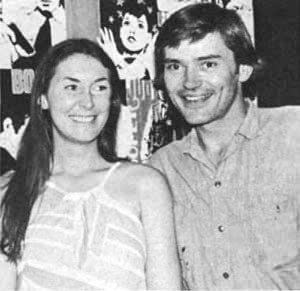 "I
was interested in health food for a while," Pete told me,
"but I really didn't know where to hang my hat on any of
it. And Diane was really into it. She grew up as a Seventh Day
Adventist and they're pretty much vegetarians--they have their
own company called Loma Linda that makes great canned vegetarian
foods. She also introduced me to Gail Davis' books which really
interested me, so I went a little further.
"I
was interested in health food for a while," Pete told me,
"but I really didn't know where to hang my hat on any of
it. And Diane was really into it. She grew up as a Seventh Day
Adventist and they're pretty much vegetarians--they have their
own company called Loma Linda that makes great canned vegetarian
foods. She also introduced me to Gail Davis' books which really
interested me, so I went a little further.
"I've always been interested in eating
well," Pete recalled with a certain air of common-sense pride.
"I believe in treating my body as well as I can--especially
with regard to the food I take into it. So I naturally observed
Diane's eating habits while she explained to me the philosophy
behind her different kind of diet. It was very easy; I said, ‘Sure,
I'll try this. I'll try that.' And I found that I liked it."
It satisfies his appetite and needs.
He broke into a slight grin. "But
the first thing that I ate I didn't really like--it was a vegeburger,
a hamburger with an all vegetable content as opposed to meat.
The second item was imitation chicken and I liked it. So from
that point, we were off and running. Anything she suggested, I
would try."
And try anything Pete has! It wasn't long
before Diane had him drinking certified raw milk instead of pasteurized,
bypassing sugar for raw honey, rejecting any and all desserts
made with sugar, spurning all white bread for nothing but whole
grain, gulping vitamin pills daily, consuming protein additives
and the like. She took him by the hand--and the palate--and led
him into a whole new world, a world in which Pete felt comfortable
and confident and curiously liberated.
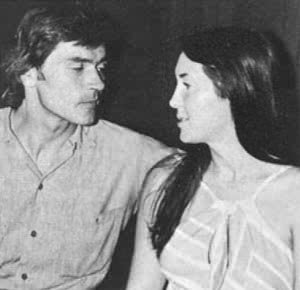 Pete sums
it up by pointing out that "it's something that makes for
a more compatible relationship because we're both very interested
in the way we eat. It's always fun."
Pete sums
it up by pointing out that "it's something that makes for
a more compatible relationship because we're both very interested
in the way we eat. It's always fun."
With equal enthusiasm and sincerity, Pete
got Diane interested in ecology. He insists that conserving on
our resources is vital if "we're going to stay out of trouble"
in the future. Soon Diane was totally convinced and was keeping
house with careful attention to water conservation and the avoidance
of sending homeborne pollutants coursing into the ocean. Their
home life became completely colored by ecological considerations.
The Pete Duel household had resembled a Mack Sennett comedy as
he and Diane scurried to and fro, scrupulously obeying the imperatives
of ecological domesticity. They constantly flicked light switches
on and off to reduce the consumption of electricity. They saved
newspapers for reprocessing to help roll back the toll of trees
felled for newsprint. A mountain of cans and bottles had risen
inside their home, a dormant mound awaiting recycling.
"I had the whole corner of the kitchen
filled with aluminum cans," Pete admitted wryly.
For ecology Pete comes on with the evangelical
fervor of an Elmer Gantry. He assails public ignorance and apathy,
government complacency and corporate ruthlessness with quixotic
fervor. But he doesn't let this interest cripple his social life.
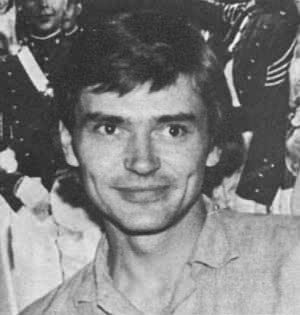 "I
talk about it only if the subject comes up," Pete told me.
"I don't walk into a room full of people and say: ‘I've
got a speech to make!' I like to have fun, too, for God's sake.
Naturally, nobody likes a preacher at a party. But, as I said,
if the subject does come up, as it often does in a normal conversation,
it will hit a certain area. Then, very naturally, I'll say something
either in reply to a question or a statement made. It all happens
very naturally."
"I
talk about it only if the subject comes up," Pete told me.
"I don't walk into a room full of people and say: ‘I've
got a speech to make!' I like to have fun, too, for God's sake.
Naturally, nobody likes a preacher at a party. But, as I said,
if the subject does come up, as it often does in a normal conversation,
it will hit a certain area. Then, very naturally, I'll say something
either in reply to a question or a statement made. It all happens
very naturally."
Pete readily affirms that their affection
for one another, their sense of harmony, the comfortable and loving
feeling they had together, all derived from their devotion to
these two causes. In fact, they had many times operated as a speaking
team.
"We really did," Pete remembered
with a burst of boyish enthusiasm. "If we were around a group
of people and started talking, Diane would take over, talking
about ecology, almost introducing anything further that I might
want to say. She'd just go through the basics, then I'd follow
through with specifics once the people were interested. Then we'd
do the opposite with nutrition--because that's fairly new to me.
So I'd lay the ground work this time, she became the technical
one."
Their relationship had been such a testament
to compatibility, I just couldn't fathom the whys and wherefores
of their split. Though they'd never been "officially"
married, they had lived under the same roof for enough time--and
shared enough devotion and love for each other--to provide stiff
competition for many "officially" married couples. Why,
then, did their sweetness sour?
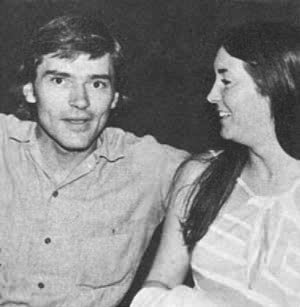 Pete gave
a long, hard look before answering. He seemed perplexed, but in
a very weary and quiet way. "If a relationship has lasted
a long time, there's never one, particular thing." He grinned
bitterly. "There is no specific reason why--nothing like
I didn't clean my fingernails..."
Pete gave
a long, hard look before answering. He seemed perplexed, but in
a very weary and quiet way. "If a relationship has lasted
a long time, there's never one, particular thing." He grinned
bitterly. "There is no specific reason why--nothing like
I didn't clean my fingernails..."
My eyes suddenly became clouded and teary--and
it wasn't from the sorrow of his words despite my profound regrets
and hopes for Diane and him. No, the cause of this physical irritation
was smoke . . . smoke from the burning cigarette that Pete clasped
tightly between his index finger and thumb, its grey, polluting
vapors groping and intertwining like shadows touching shadows'
hands. Suddenly the full irony of the situation grabbed me.
"To change the subject for a moment,"
I chided gently, "here you were making an all-out declaration
of war against pollution, and there you sit polluting your lungs
with a cigarette." I had to smile. "Isn't that stupid?"
Pete agreed.
That opened the can of beans on the once-kicked
habit that Pete dreams of kicking again. He sighed to think about
how nice it had been during the two and a half years in which
he'd been free of the curse of nicotine.
‘‘Nothing would terrify me more,"
he recalled, "than to have a dream where I'd have a cigarette.
But when I'd wake up in the morning and realize that I hadn't
really, I felt great. What a difference it makes just leaving
the house! You get up. You wash. You dress. But when you're a
smoker, you get up--and you have a cigarette. Then you shower.
Before you shower, you say, ‘I think I'll have another cigarette.'
Then the first thing you do when you get out of the shower is
grab another cigarette.
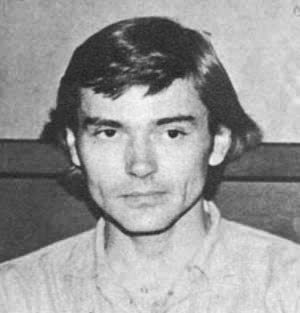 "After
slipping something on, you're ready to eat something. Only by
now you've had three or four cigarettes and you're really not
that hungry. But you'd better eat something--so you go into the
kitchen, fix something, and have another cigarette. Then you put
the pack down but forget where you left it. You're ready to go
out and you're looking for your cigarettes. ‘Where are they?
Do I have enough matches? Wait a minute. I'll be right there.
I've got to get some matches.'"
"After
slipping something on, you're ready to eat something. Only by
now you've had three or four cigarettes and you're really not
that hungry. But you'd better eat something--so you go into the
kitchen, fix something, and have another cigarette. Then you put
the pack down but forget where you left it. You're ready to go
out and you're looking for your cigarettes. ‘Where are they?
Do I have enough matches? Wait a minute. I'll be right there.
I've got to get some matches.'"
Pete made a distasteful face as he went
through the whole catechism. He had mentioned earlier that personal
tragedy had pressured him back into smoking after having kicked
the habit. Now I was curious about just what that tragedy had
been.
"This is ironic," he replied
sheepishly. "My grandfather was dying of cancer--stomach
cancer--which can, in some cases, be traced to cigarettes and
tar. He had been a pipe smoker."
Pete had been doing Love On A Rooftop
at the time. He was very fond of his grandfather and his terminal
illness kept Pete on edge. He'd let his nervousness lead him into
joining his wardrobe man for a cigar about two or three times
a week--but he was careful, at least in the beginning, not to
inhale.
"But it was still a big mistake,"
Pete observed. "Every book on breaking the habit mentions
that you cannot touch anything even if you're not inhaling. So
those three cigars a week set the stage. Then when I went back
to Pennsylvania to visit my grandfather, I'd go to a little bar
in Altoona and have a few beers and cigars after he went to sleep
for the night.
"After two or three beers, I'd start
inhaling the cigars while listening to sad music on the juke box.
A month later, I was smoking many cigars each day--inhaling everyone
of them. So it all started again."
Suddenly it dawned on Pete how foolish
that was. If he was going to be inhaling cigars, he might as well
go back to cigarettes and enjoy it (if ‘‘enjoy"
is a fitting word at all). In no time, he was re-hooked.
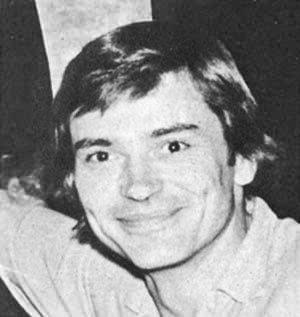 Being
on the outs with Diane has caused new tensions and anxieties that
pathetically surfaced every time I watched him fumble for a cigarette
after he had swallowed a mouthful of health food.
Being
on the outs with Diane has caused new tensions and anxieties that
pathetically surfaced every time I watched him fumble for a cigarette
after he had swallowed a mouthful of health food.
I asked him whether any progress was being
made toward a reunion. "Let's say that we're dealing with
each other again." His terminology gave rise to the impression
that it wasn't quite like before, that though they were seeing
each other again, it wasn't exclusively--as it used to be. But
Pete didn't like the sound of that.
"Not exclusively. . . that's
so cliche. When you have broken up with someone, ‘seeing
each other ‘ isn't even good. When I say we are seeing each
other again I mean first our romance, our relationship, our whole
thing breaks up, and now we're working at it again. We're trying
to put it together again."
What has been happening between Pete and
Diane, it seems, is not so much an attempt to rekindle old fires
but an effort to light new ones. Pete emphasized his hope that
he and Diane would be able to move together from where
they were--not get back to where they were.
"This will be a new feeling,"
he reflected with a note of cheer. "We've both changed quite
a bit. We've both learned quite a lot from whatever we've done
before. And we're going at it just one step at a time. Whatever
happens will happen--that's all."
But Pete soberly recognizes that it is
always possible for things not to work out as he wishes.
"If it works out to our mutual benefit,
we'll be together," he said. "Otherwise, no. We don't
want to be a part of something that will destroy one or the other
of us."
So there they were–the two habits
that Pete is trying to cope with the best he can, the one he wants
to regain and the one he hopes to lose. And there is hope: he
kicked smoking once before and once he and Diane shared a very
deep love--one they still may share.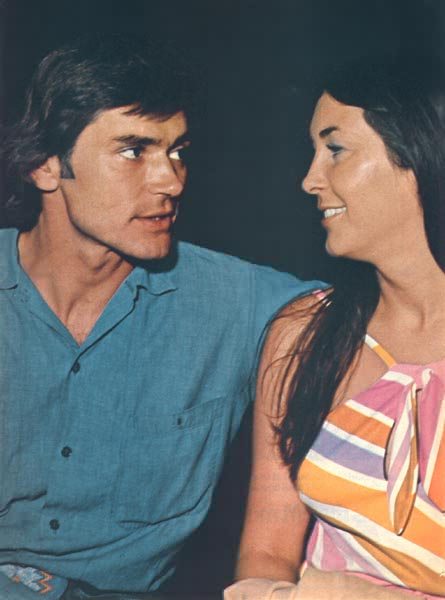
Pete Duel is a determined, practical,
and dedicated man. He is not afraid to back up the things that
mean something to him. He is not afraid to try new ideas or experiment
with the validity of existing old ones. Most important, however,
his own beliefs are never betrayed.
True, his comments about reconciliation
left one with a terribly tentative feeling. But, as Pete pointed
out, "Tentative is a good word if you use it kindly and positively."
Back
to Articles List
 We're all
victims of habits, some of them pleasant and others not the least
bit pleasant at all. Losing a habit that brought you joy can
be just as painful as being unable to shake one that you detest.
This tried and trying truth was recently revealed to Pete Duel,
the stern and handsome star of the popular television series
Alias Smith And Jones. Pete has been touched by two disconcerting
developments in the past few months--his most hated habit, smoking,
has crept up on him once again, and his most loved habit, Diane
Ray, is now gone from his side. The problem Pete faces is to
find a way to effectively remedy both unpleasant realities.
We're all
victims of habits, some of them pleasant and others not the least
bit pleasant at all. Losing a habit that brought you joy can
be just as painful as being unable to shake one that you detest.
This tried and trying truth was recently revealed to Pete Duel,
the stern and handsome star of the popular television series
Alias Smith And Jones. Pete has been touched by two disconcerting
developments in the past few months--his most hated habit, smoking,
has crept up on him once again, and his most loved habit, Diane
Ray, is now gone from his side. The problem Pete faces is to
find a way to effectively remedy both unpleasant realities.
 "I
was interested in health food for a while," Pete told me,
"but I really didn't know where to hang my hat on any of
it. And Diane was really into it. She grew up as a Seventh Day
Adventist and they're pretty much vegetarians--they have their
own company called Loma Linda that makes great canned vegetarian
foods. She also introduced me to Gail Davis' books which really
interested me, so I went a little further.
"I
was interested in health food for a while," Pete told me,
"but I really didn't know where to hang my hat on any of
it. And Diane was really into it. She grew up as a Seventh Day
Adventist and they're pretty much vegetarians--they have their
own company called Loma Linda that makes great canned vegetarian
foods. She also introduced me to Gail Davis' books which really
interested me, so I went a little further. Pete sums
it up by pointing out that "it's something that makes for
a more compatible relationship because we're both very interested
in the way we eat. It's always fun."
Pete sums
it up by pointing out that "it's something that makes for
a more compatible relationship because we're both very interested
in the way we eat. It's always fun." "I
talk about it only if the subject comes up," Pete told me.
"I don't walk into a room full of people and say: ‘I've
got a speech to make!' I like to have fun, too, for God's sake.
Naturally, nobody likes a preacher at a party. But, as I said,
if the subject does come up, as it often does in a normal conversation,
it will hit a certain area. Then, very naturally, I'll say something
either in reply to a question or a statement made. It all happens
very naturally."
"I
talk about it only if the subject comes up," Pete told me.
"I don't walk into a room full of people and say: ‘I've
got a speech to make!' I like to have fun, too, for God's sake.
Naturally, nobody likes a preacher at a party. But, as I said,
if the subject does come up, as it often does in a normal conversation,
it will hit a certain area. Then, very naturally, I'll say something
either in reply to a question or a statement made. It all happens
very naturally." Pete gave
a long, hard look before answering. He seemed perplexed, but in
a very weary and quiet way. "If a relationship has lasted
a long time, there's never one, particular thing." He grinned
bitterly. "There is no specific reason why--nothing like
I didn't clean my fingernails..."
Pete gave
a long, hard look before answering. He seemed perplexed, but in
a very weary and quiet way. "If a relationship has lasted
a long time, there's never one, particular thing." He grinned
bitterly. "There is no specific reason why--nothing like
I didn't clean my fingernails..." "After
slipping something on, you're ready to eat something. Only by
now you've had three or four cigarettes and you're really not
that hungry. But you'd better eat something--so you go into the
kitchen, fix something, and have another cigarette. Then you put
the pack down but forget where you left it. You're ready to go
out and you're looking for your cigarettes. ‘Where are they?
Do I have enough matches? Wait a minute. I'll be right there.
I've got to get some matches.'"
"After
slipping something on, you're ready to eat something. Only by
now you've had three or four cigarettes and you're really not
that hungry. But you'd better eat something--so you go into the
kitchen, fix something, and have another cigarette. Then you put
the pack down but forget where you left it. You're ready to go
out and you're looking for your cigarettes. ‘Where are they?
Do I have enough matches? Wait a minute. I'll be right there.
I've got to get some matches.'" Being
on the outs with Diane has caused new tensions and anxieties that
pathetically surfaced every time I watched him fumble for a cigarette
after he had swallowed a mouthful of health food.
Being
on the outs with Diane has caused new tensions and anxieties that
pathetically surfaced every time I watched him fumble for a cigarette
after he had swallowed a mouthful of health food.